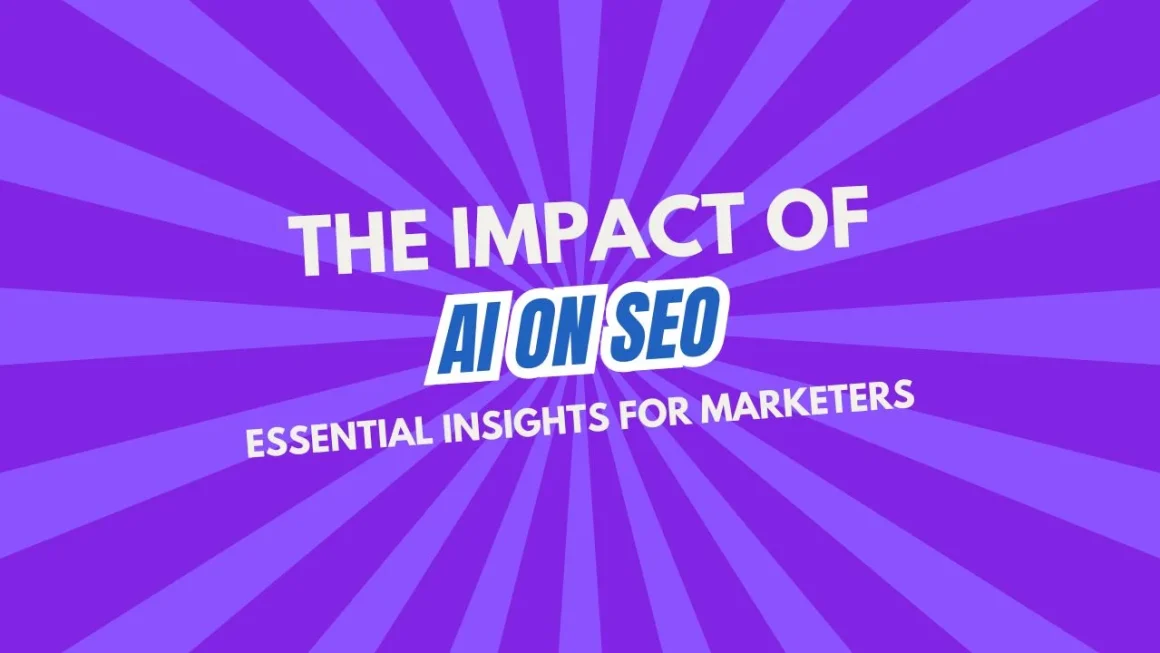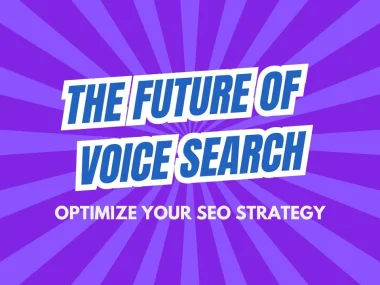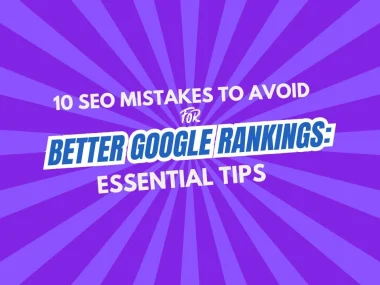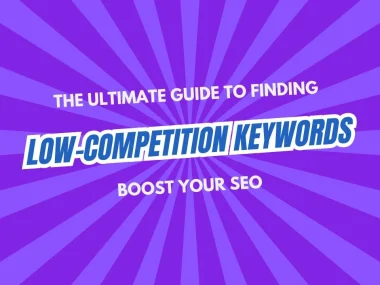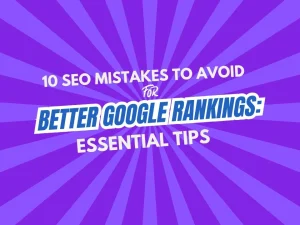AI is transforming SEO by enhancing keyword research, content creation, and user experience. Marketers must adapt to stay competitive.
AI-powered tools analyze vast amounts of data to identify trends and insights quickly. This allows marketers to craft more relevant content, improving search engine rankings. Machine learning algorithms personalize user experiences, which boosts engagement and conversion rates. As AI continues to evolve, it automates time-consuming tasks like SEO audits and competitor analysis, freeing up marketers to focus on strategy and creativity.
Staying updated with AI advancements helps marketers maintain a competitive edge. Understanding AI’s role in SEO is essential for anyone looking to enhance their digital marketing efforts.
Introduction To AI In SEO
Artificial Intelligence (AI) is transforming how marketers approach SEO. AI helps improve search rankings and understand user intent better. Marketers can now use AI to automate tasks and analyze data efficiently.
AI’s Role In Modern SEO
AI shapes modern SEO by enhancing content relevance. It helps search engines understand and rank content accurately. Here are some ways AI impacts SEO:
- Content Creation: AI tools generate high-quality content quickly.
- Keyword Research: AI finds the best keywords to target.
- Voice Search Optimization: AI optimizes for voice search queries.
- User Experience: AI enhances website user experience.
Historical Context
SEO started as simple keyword stuffing and backlinks. Search engines evolved and AI became crucial. Early search engines could not understand user intent. AI now helps search engines grasp context and deliver better results.
Here is a brief timeline:
| Year | SEO Milestone |
|---|---|
| 1990s | Basic keyword usage and link building |
| 2000s | Introduction of algorithms and penalties |
| 2010s | AI integration in search algorithms |
| 2020s | Advanced AI-driven SEO strategies |
AI-powered Tools For SEO
AI-powered tools for SEO are transforming digital marketing. They help marketers enhance their strategies efficiently. These tools are essential for staying competitive in the evolving SEO landscape.
Keyword Research
AI tools simplify keyword research. They analyze vast amounts of data quickly. This helps identify high-performing keywords. AI can predict trends and user intent.
- Identify relevant keywords
- Analyze competitors’ keywords
- Discover new keyword opportunities
With AI, you can find keywords that drive traffic. This leads to better targeting and higher rankings.
Content Optimization
AI-powered tools enhance content optimization. They analyze content for SEO best practices. This includes keyword density, readability, and relevance.
| Feature | Description |
|---|---|
| Keyword Density | Ensures optimal keyword usage |
| Readability | Improves content clarity |
| Relevance | Aligns content with user intent |
AI tools provide actionable insights. These insights help create engaging and SEO-friendly content. This boosts search engine rankings and user engagement.
Machine Learning Algorithms
Machine learning algorithms play a crucial role in modern SEO. These algorithms can analyze large data sets and identify patterns. This helps marketers optimize their content and improve search rankings.
Understanding Algorithms
Algorithms are sets of rules or instructions. They help machines solve problems or complete tasks. In SEO, algorithms determine the ranking of web pages on search engines. They consider factors like keywords, backlinks, and user engagement.
Machine learning algorithms learn from data. They improve their performance over time. This means they can adapt to new trends and patterns. For marketers, understanding these algorithms is essential. It helps them create effective SEO strategies.
Applications In SEO
Machine learning algorithms have several applications in SEO. Here are some key areas:
- Keyword Research: Algorithms analyze search data to find relevant keywords.
- Content Optimization: They identify the best content structure for better ranking.
- Link Building: Algorithms find high-quality backlinks to improve authority.
- User Behavior Analysis: They track user interactions to improve site engagement.
Marketers can use these insights to enhance their SEO efforts. Here is a table summarizing these applications:
| Application | Description |
|---|---|
| Keyword Research | Find relevant keywords from search data. |
| Content Optimization | Identify the best content structure for ranking. |
| Link Building | Find high-quality backlinks for authority. |
| User Behavior Analysis | Track user interactions for better engagement. |
Machine learning algorithms help marketers stay ahead in SEO. They provide valuable insights and automate complex tasks. This leads to improved search rankings and better user experience.
Voice Search And AI
Voice search is changing how people find information online.
With the rise of AI-powered voice assistants, SEO strategies must evolve.
Marketers need to understand these changes to stay ahead.
Rise Of Voice Search
Voice search has grown rapidly. Many people use smart speakers like Alexa and Google Home.
They ask questions instead of typing. This trend has increased voice searches.
According to recent studies, voice searches make up over 50% of all searches.
This shift changes how users interact with search engines.
Queries are more conversational and natural.
Adapting SEO Strategies
Marketers must adapt their SEO strategies for voice search.
Focus on long-tail keywords that match natural speech patterns.
Use structured data to help search engines understand your content.
Consider creating an FAQ section on your website.
Answer common questions directly. This helps with featured snippets and voice search results.
| Tip | Description |
|---|---|
| Use Conversational Keywords | Focus on long-tail keywords that mimic natural speech. |
| Optimize for Local Search | Include local phrases and landmarks. |
| Implement Structured Data | Use schema markup to provide context to search engines. |
| Create FAQ Pages | Answer common questions users might ask. |
By adapting your SEO strategies, you can stay ahead.
Keep up with the latest trends in voice search and AI.
This ensures your content remains relevant and easily discoverable.
Personalization In Search Results
Artificial Intelligence (AI) has revolutionized the way search engines deliver results. One of the most significant changes is the personalization of search results. This means search engines tailor results based on a user’s preferences and past behavior. Let’s explore how this affects marketers.
User Intent
Understanding user intent is crucial for delivering relevant search results. AI can analyze search queries to determine what users really want. For example, if someone searches for “apple”, AI will consider past searches and preferences to decide if they mean the fruit or the tech company.
Search engines now use machine learning to predict user intent more accurately. This helps in providing results that are more aligned with what the user is seeking. Marketers need to focus on creating content that matches various user intents.
Customized Content
AI also allows for the creation of customized content. This means delivering content that is specifically tailored to individual users. For example, a user interested in sports might see more sports-related articles in their search results.
Here are some ways to create customized content:
- Use AI tools to analyze user data.
- Segment your audience based on interests and behavior.
- Create different content for different user segments.
By focusing on personalized content, you can improve user engagement and satisfaction. This leads to better rankings and more traffic.
| Benefit | Description |
|---|---|
| Improved Relevance | Content matches user preferences. |
| Higher Engagement | Users spend more time on relevant content. |
| Better Rankings | Search engines favor personalized content. |
Personalized search results are here to stay. Marketers must adapt to these changes to stay ahead.
AI And SEO Analytics
Artificial intelligence (AI) is transforming how marketers approach SEO. AI can analyze vast amounts of data quickly. It helps in making informed decisions to boost website rankings. Let’s dive into how AI impacts SEO analytics.
Data Interpretation
AI excels in data interpretation. Traditional methods struggle with large datasets. AI can sift through data and find patterns. These patterns guide SEO strategies.
AI tools can analyze:
- Click-through rates
- Keyword performance
- User behavior
AI helps in understanding user intent. This makes content more targeted and relevant.
Predictive Analysis
Predictive analysis is another strength of AI. It uses past data to forecast future trends. This allows marketers to stay ahead of competition.
AI can predict:
- Keyword trends
- Content performance
- User engagement
With predictive analysis, marketers can optimize their strategies. This leads to better SEO results.
AI-driven insights are precise. They help in making data-backed decisions. This results in higher search engine rankings.
Challenges Of AI In SEO
Artificial Intelligence (AI) has revolutionized SEO, offering unprecedented efficiency and precision. Yet, its integration into SEO practices comes with unique challenges. Understanding these challenges is crucial for marketers to leverage AI effectively.
Ethical Considerations
AI in SEO raises several ethical issues. AI can automate content creation, but the authenticity of such content can be questioned. Plagiarism and the creation of misleading information are significant concerns. Marketers must ensure AI-generated content is both original and truthful.
Another ethical issue is data privacy. AI tools often collect vast amounts of user data. This can lead to privacy breaches if not handled responsibly. Marketers need to prioritize user consent and data security.
Algorithm Bias
AI algorithms can exhibit bias. These biases can influence search engine rankings unfairly. For instance, AI might favor certain websites over others due to biased training data. This can lead to an uneven playing field in SEO.
Bias in AI can also affect user experience. Biased algorithms might show irrelevant or skewed search results. This can frustrate users and reduce engagement. Marketers must regularly audit AI tools to minimize bias.
| Challenges | Description |
|---|---|
| Ethical Considerations | Concerns about content authenticity and data privacy. |
| Algorithm Bias | AI biases can skew search results and rankings. |
Marketers should address these challenges to maximize AI’s potential in SEO.
Future Trends
As technology advances, the impact of AI on SEO continues to grow. Marketers must stay informed about future trends. This ensures they remain competitive in the digital landscape.
Evolving Technologies
AI is transforming SEO with new technologies. These changes affect how websites rank. Let’s explore some key evolving technologies:
- Voice Search Optimization: More people use voice assistants. Optimize content for voice queries.
- AI-Powered Content Creation: Tools like GPT-3 generate high-quality content. This saves time for marketers.
- Enhanced User Experience: AI analyzes user behavior. It helps improve site design and navigation.
- Predictive Analytics: AI predicts trends. This helps marketers stay ahead of the curve.
Preparing For Change
Marketers must adapt to these changes. Here are some steps to prepare for the future:
- Invest in AI Tools: Use AI tools for content creation and analysis.
- Stay Updated: Follow industry news. Learn about new AI trends.
- Improve User Experience: Focus on site speed and mobile optimization.
- Optimize for Voice Search: Use natural language in your content.
By following these steps, marketers can stay ahead. Embracing AI will lead to better SEO results.
Frequently Asked Questions
How Does AI Affect SEO?
AI impacts SEO by improving search algorithms, personalizing user experiences, and automating tasks like keyword research and content optimization.
Can AI Optimize My SEO Strategy?
Yes, AI can analyze data, predict trends, and offer insights to enhance your SEO strategy effectively.
What AI Tools Help With SEO?
AI tools like SEMrush, Ahrefs, and MarketMuse assist with keyword research, content optimization, and competitive analysis.
Is AI Necessary For Modern SEO?
AI is becoming essential for modern SEO due to its ability to process large data sets and offer actionable insights.
Conclusion
AI is revolutionizing SEO, offering new tools and strategies. Marketers must adapt to stay competitive. Embrace AI to enhance your SEO efforts and drive better results. Stay updated with trends to maintain a strong online presence. Leveraging AI effectively can lead to significant marketing success.

